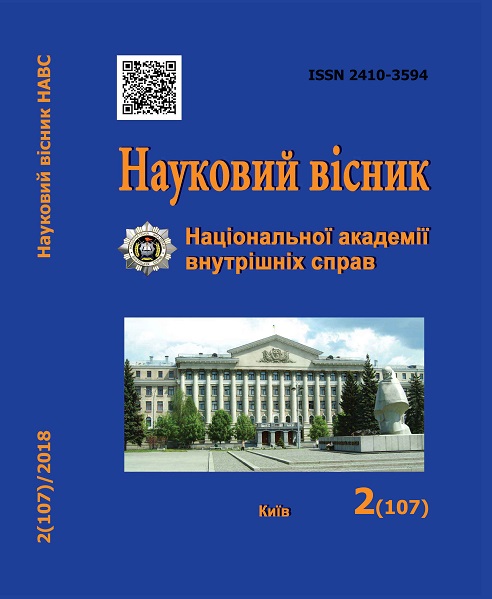Use of Special Knowledge during the Investigation of Crimes Related to the Illicit sale of Drugs, Psychotropic Substances and Analogues
Abstract
The definition of "special knowledge" first appeared in criminology when solutions for challenges regarding collection, examination and evaluation of evidence required involvement of experts with special knowledge in special areas including science, crafts and art. Special knowledge is identified as objective knowledge and skills obtained as a result of higher professional training, research activity, practical experience complying with current theoretical and practical requirements and standards. This article provides analysis of reasonability and appropriateness of specialists and experts’ knowledge to be used in the process of investigating crimes related to illegal distribution of narcotic drugs. Key forms of special knowledge use are distinguished with provision of full list of examinations and indicative list of questions referred to the expert by investigator in order to complete the investigation. The main forms of special knowledge use include the involvement of an expert for conducting an expert examination and giving opinions on questions arising during the criminal proceedings and relating to his field of knowledge (Art. 69 of the Criminal Procedural Code of Ukraine) and expert consultations during the pre-trial investigation and trial, requiring appropriate specialist knowledge and skills (Art. 71 of the Criminal Procedural Code of Ukraine). When detecting criminal offenses related to the sale of drugs, the application of special knowledge occurs at almost every stage of criminal proceedings. For example, during a search of an apartment in a suspected drug trafficker, an expert-criminalist (specialist) applies scientific and technical tools and techniques for detecting and fixing objects, assisting the investigator to carry out a preliminary study and assumptions about the probability of origin of the detected substances, objects from the purpose of identifying in them the features and properties that have probative value in the criminal proceedings. Also, an expert-criminalist (specialist) helps the investigator to draw up a protocol for conducting an investigative (search) action, advises on the specific terms used in the description of drugs, certain types of precursors and reagents, intermediate and final products and other traces and material evidence that have been discovered, helps to make fragments of the protocol in which it is a question of detected carriers of tracks, with indication of their location, fixation methods and seizure, used forensic technology, which enable to identify them by referring to a forensic examination. Interaction of the investigator and expert is an important part in collecting and evaluating material evidence (samples) of their sufficiency and suitability for further research. If necessary, a forensic expert can offer the investigator to involve other specialists in the crime scene examination and search he does not have the proper qualification (for example, the video operator, demining team or K-9 team members etc). Therefore, the criminologist not only solves the problems of detecting and fixing the traces of narcotic drugs, but also helps the investigator to solve general problems aimed at establishing all the factual circumstances that characterize the object and object, the objective and subjective factors, the dangers of the indicated drug offense and its subject. Therefore, examination is an obligatory and the most informative way of special knowledge to be used in criminal proceedings regarding the illegal distribution of narcotic drugs.
Downloads
Abstract views: 223 PDF Downloads: 159
- Authors reserve the right to authorship of their own work and transfer to the magazine the right of the first publication of this work under the terms of the Creative Commons Attribution License, which allows other persons to freely distribute published work with mandatory reference to authors of the original work and the first publication of an article in this magazine.
- Authors have the right to enter into separate additional agreements on non-exclusive dissemination of the work in the form in which it was published in the journal (for example, to post an article in the institution's repository or to publish as part of a monograph), provided that the link to the first publication of the work in this journal is maintained.
- The journal's policy allows and encourages the posting of articles by authors on the Internet (for example, in electronic storehouses of institutions or on personal websites), both before the submission of this manuscript to the editorial office and during its editorial processing, as this contributes to the creation of a productive scientific discussion and positively affects the efficiency and dynamics of citing the published work.




